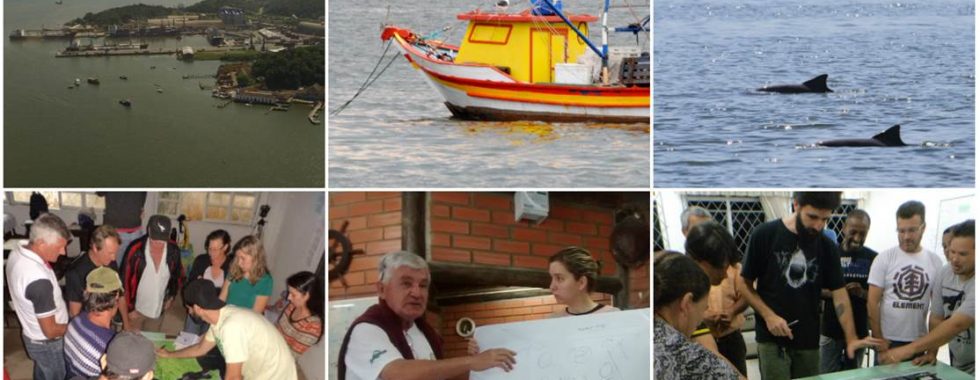Main projects and cooperations are part of the joint activities developed by the South American Regional Engagement Partner:
Continent-Ocean Materials Transfer
The understanding of the transport, accumulation, cycling and bioavailability of nutrients, organic matter and trace metals in the land-ocean interface will be achieved by comparing different coastal and continental shelf systems along the east-north-northeastern and Southeast-South coastal areas of Brazil under different environmental situations, particularly on the behavior of the fluvial-estuarine continuum under semi-arid (Northeastern coast) humid tropical (North) and sub-tropical humid (Southeastern-south coast) under the intensive human development resulting from pressures due to river damming, water diversion and basin transposition, urbanization, industrialization, agriculture, and aquaculture. The use of environmental geochemical tracers, including both organic and inorganic, natural isotopes and radioisotopes, and historical sets of data and remote sensing analysis will make allow the evaluation of the variation in time of the processes, while paleoenvironmental reconstruction will help understand the response to global climate change.
Moreover, the understanding of the drivers influencing the bioavailability of persistent pollutants (metals and POP’s) and the human exposure to them will subsidy policies related to environmental health.
Major objectives are:
i) On the environmental geochemistry framework: to evaluate the changes in sediment, organic matter, nutrients and pollutants fluxes from the continent downriver to the estuarine areas with emphasis on changes in basin morphology, erosion and sedimentation of estuaries. A hierarchical typology of such drivers should be achieved in order to balance future planning actions for the watersheds and the coastal zone.
ii) On the human dimensions, the project will evaluate social-economic impacts of the productive chains of artisan fisheries and irrigated agriculture of the basins, with emphasis on water use conflicts, erosion of agricultural lands and sedimentation, and options for mitigation and adaptation. On the global and regional climate change scenarios, the project will analyze changes in biodiversity proxies of global and land use changes, including changing of natural ecosystems and biodiversity to construct future scenarios and propose planning strategies.
iii) Establish international cooperation will allow the buildup of human capacity to decrease regional inequalities and the application of the results to solve local, regional, continental and intercontinental problems.
Research Activities: Vulnerability of the continent-ocean interface and threats to society and sustainability of its systems; Integrate the natural, social and economic disciplines that are necessary to collaborate effectively to create consistent scenarios and problem solving ; considers temporal and spatial scales, with an emphasis on the inclusion of socio-economic surveys; transfer the results to government agencies and participants responsible for providing results to support the activities of these agencies and Development of new concepts, tools and strategies.
Website
Key Contact: Prof. Luiz Drude de Lacerda ([email protected]) or Prof. Carlos E Rezende ([email protected]) or Dr. Rozane Valente Marins ([email protected])
Brazilian Future Ocean Panel – PainelMar
PainelMar aims at serving as a multi-sectorial collaborative platform of individuals and organizations on the interface of knowledge and decision-making processes, to qualify policies for the sustainable use and good health of the oceans – illuminating, with qualified information, public policies for the coastal regions and the Brazilian sea. This platform is guided by a Strategic Document that has been progressively elaborated by 50+ Brazilian and international collaborators since the preparatory events for the United Nations Conference on Sustainable Development (Rio + 20).
Research Activities: Catalyze transdisciplinary collaborations to improve ocean governance in Brazil.
Website
Key Contact: Dr.Leopoldo Cavaleri Gerhardinger; E-mail: [email protected]
BabitongaAtiva Project
The Babitonga Bay is the southernmost large representative of a mangrove ecosystem in the subtropical Atlantic (Brazil) and it is surrounded by six coastal urban areas with one million inhabitants and it is the largest metropolitan region of Santa Catarina state. The Babitonga estuary encompasses 75% of the state mangrove areas and holds several critically endangered species of small cetaceans (e.g., porpoises) and marine fishes. In total, there are eight Federal Decrees by the Ministry of Environment designating the Babitonga ecosystem as being of national ecological relevance. On the other hand, this coastal-marine area is intensively used by more than 1,700 fishermen; two large ports are installed there and about other six facing environmental licensing process. In addition, the Babitonga Bay is also influenced by mining, aquaculture and tourism activities, which do not go along without social conflicts and ecological degradation.
This is done through an ecosystems-based project combining transdisciplinary marine social-ecological systems science, an ambitious levels of social participation and very clear policy goals. After one year, the project has regularly engaged with 400 direct resource users in several parallel but interrelated activities. For instance, 177 citizens took part in 19 MSP workshops, while other 180 (six groups, one in each city) took part in a ten-month transdisciplinary course on ecosystems stewardship (or eco-citizenship in Portuguese) with the general objective of engaging with operating coastal and marine ecosystems-based policies and decision-making structures and building new ones to match the Babitonga ecosystem-level. The project thus orchestrates various governmental and societal organizations in co-designing new governing structures such as marine protected areas, as part of a bottom-up and inclusive regional Marine Spatial Planning process. The project was also recently entitled by the Federal government licensing authority with the opportunity to help unifying several environmental monitoring programs that are currently in place for each of the existing ports, into one coherent ecosystems-based monitoring proposal. So far, previous political resistance from municipal governments, industry, commerce and fishers to designation of a new MPA, which has been proposed since 2005, is been resolved through intense and transparent dialogue and negotiation provided by the project.
Research Activities:Research collaborations sought in coastal governance; design and implementation of marine protected areas; marine spatial planning; ecosystem-services assessment; marine pollution
Website
FaceBook
Key Contact: Leopoldo Cavaleri Gerhardinger; E-mail: [email protected]


